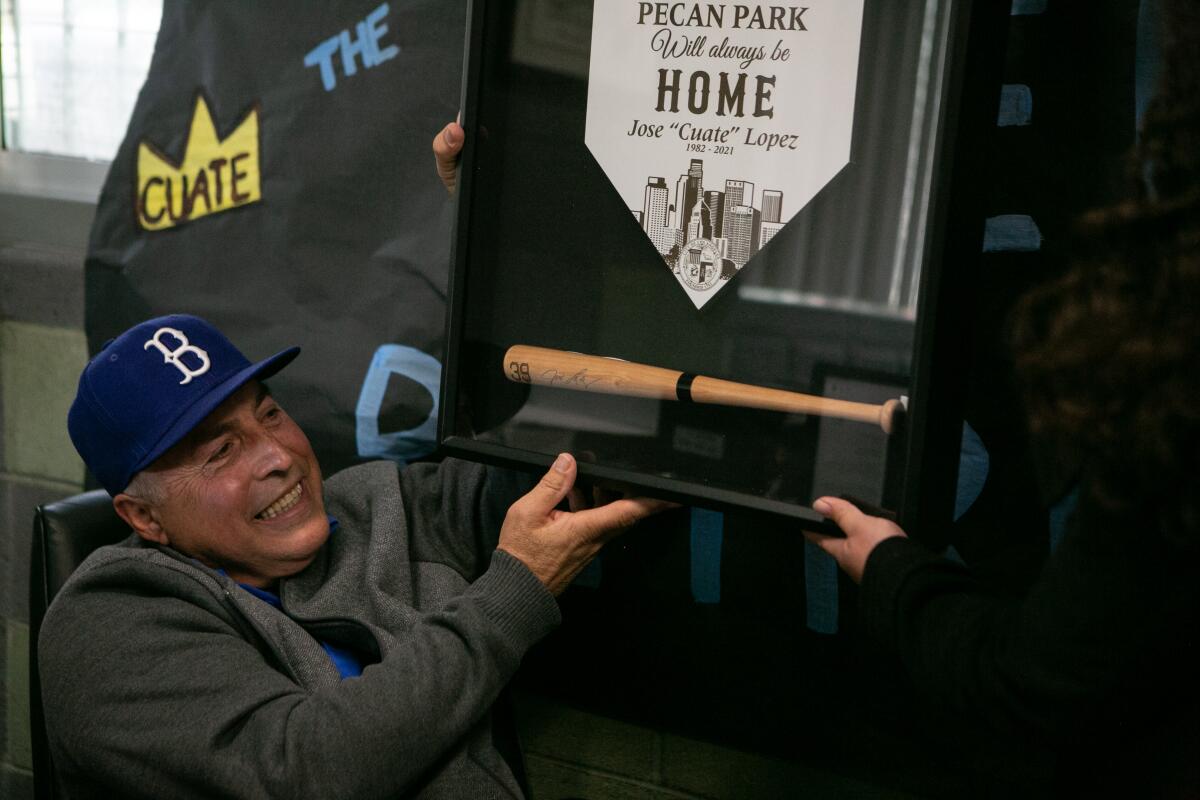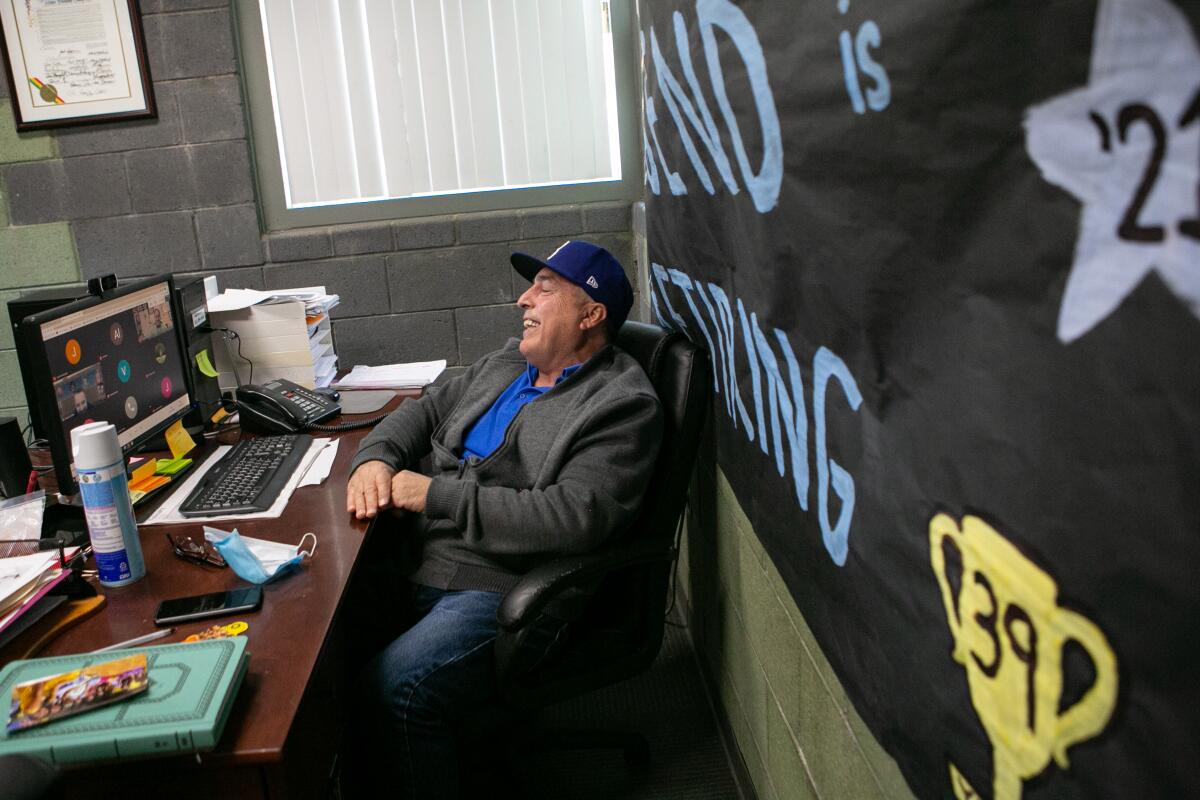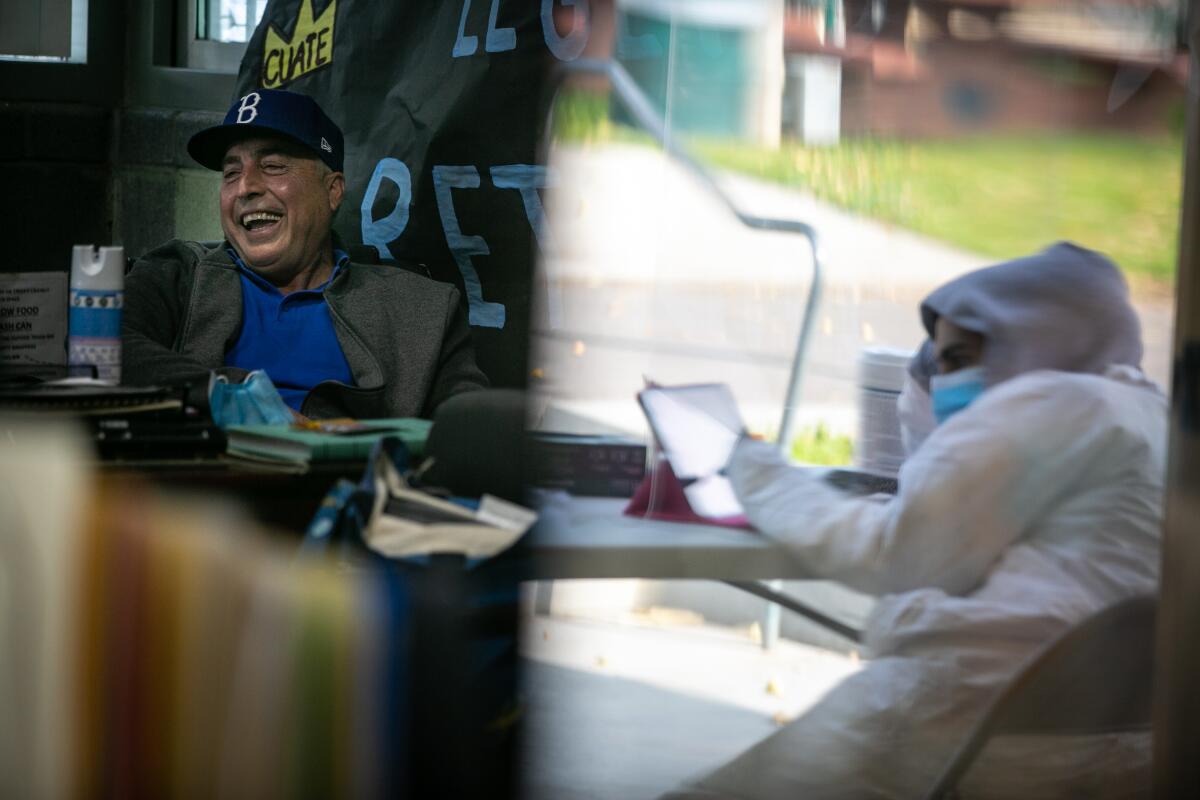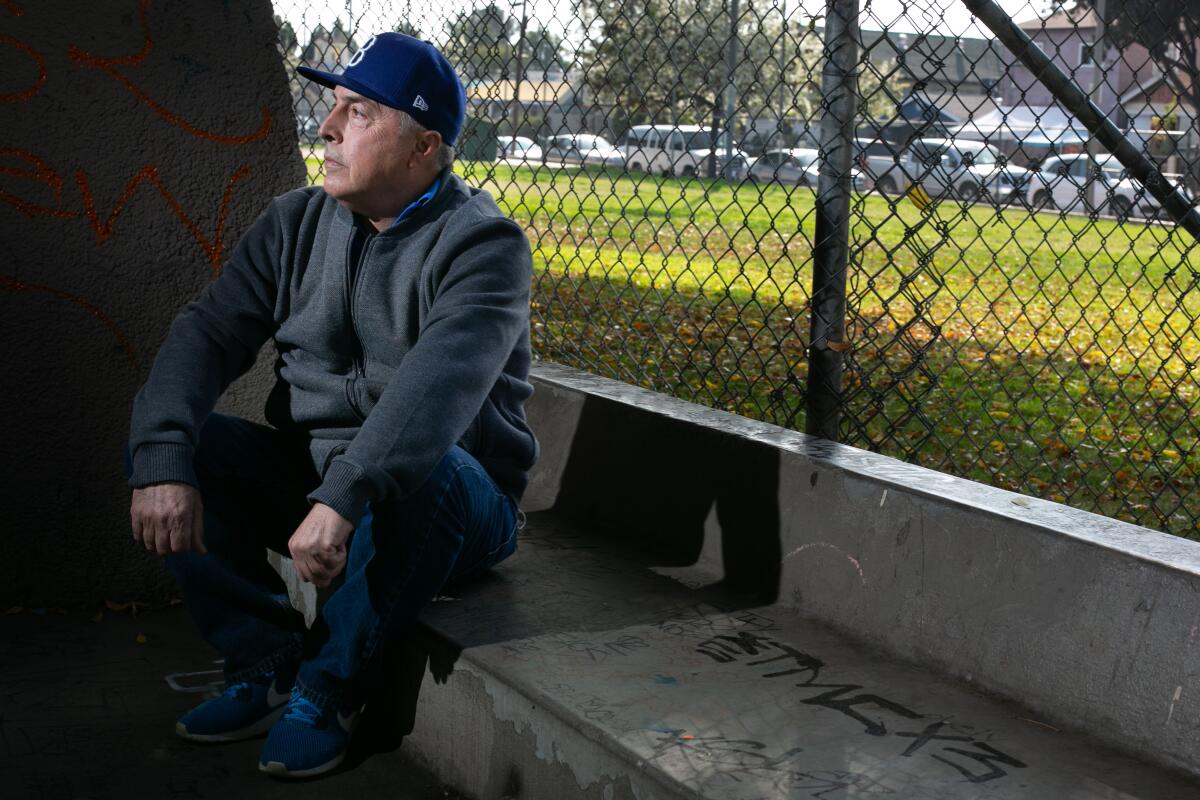Column: His title was recreation director, but for nearly 40 years, he was much more

On his last day at work after nearly 40 years, Jose “Cuate” Lopez was thanked over and over by colleagues and acquaintances for his service. Humbled by the show of appreciation, he walked outside the gymnasium at Pecan Recreation Center in Boyle Heights and looked out at the grounds as if peering into his past.
He had been a kid out there once, a child of the projects playing ball at the park, back when safe harbors were scarce in this neighborhood. He would grow up to become the rec center director, a job title that barely begins to explain the true depth of the work involved.
He was mentor, coach, social worker, therapist, gang interventionist.
And now he was moving on.
“It hits you,” Lopez said Wednesday afternoon, looking across the courts, ball fields and open spaces in the direction of the downtown skyline. “It’s like leaving your house forever.”
The man known as Cuate — his twin brother died at birth, and the word means “twin” in Spanish — will be remembered for handling his job with humility and an abiding sense of purpose.
“Oh man, I’m going to get teary-eyed,” said Ana Valdez, who worked at Pecan for about 10 years. “He taught me that the job isn’t just about a paycheck; it’s a personal investment. You’re investing in the community. It takes time and a lot of patience and dedication.”
Father Greg Boyle, who worked at the nearby Dolores Mission before moving on to Homeboy Industries, said those who respected Lopez ranged from mothers in the projects to gang members on the streets. There was, Boyle said, “not a soul who didn’t love him.”

Boyle explained why with an example from his own life. As a priest in the neighborhood, he recalled, he used to regularly respond to gunfire by finding the nearest kid with a bike, confiscating the wheels — even if barely bigger than a tricycle — and pedaling as fast as he could toward the sound of the shots. One day Lopez called him, breathlessly, about something going down at Pecan, and Boyle raced over “expecting a huge gang fight.”
But when he arrived, Boyle realized the call had been a ruse.
“There’s Cuate, with a couple of park workers, with a big ol’ beach cruiser,” Boyle said. Cuate had gotten the padre a proper bicycle, and the gift was presented with a big bow on it.
For Lopez, the giving began early. His mother worked in the garment district, and his dad was a painter, and it fell to Lopez, the eldest of five, to care for the brood when his parents were working.

Years later, he lost two of those siblings to violence, one of them just two years ago, and he still seems shaken by the loss. Cuate and his wife took in the young child of the brother who died in 2019 and are raising him, which means Cuate’s plans to travel the world in retirement are off the calendar for now.
He told me he is looking at it as a blessing, because it means one more chance to be there for a child in need.
And there has been much of that for Lopez over the years.
“A lot of the kids were missing fathers, so Jose was the big brother, and he was the dad,” said Ruben Rodriguez, who grew up in the neighborhood and attended Roosevelt High with Lopez. “He was a big believer in giving everybody a fair shot … and he understood how important it was to have programs for the kids.”

Rodriguez told me his own mother was like that. Rather than make judgments about kids who’d gone astray, she often went to juvenile hall to visit youngsters from the neighborhood. One time he asked her why.
“She said there are a lot of 12-year-old kids there who are crying because no one goes and sees them,” said Rodriguez.
Cuate learned early on that if he kept the park in nice shape and beefed up the rec center’s offerings, he had a better chance of keeping kids out of trouble. He tried to cover up gang tagging as soon as he saw it. He lobbied for speedy repairs when resources were slim, and he did his own handiwork if maintenance crews were backed up.
Pecan’s programs have included day camps, computer labs, arts and crafts classes, after-school clubs and year-round sports. The rec center office has dozens of trophies for baseball, soccer, volleyball and basketball championships, awarded for regional competition.
Gus Mojica, raised in the projects by a single mother, played ball at Pecan until he was 13, at which point, he says, “I went the other way.”
Mojica said he got “jumped in,” joined a gang, and Lopez “tried to coach me out.” But Mojica, now 46, didn’t listen to his mother back then, and he wasn’t going to listen to Lopez, either. Except to honor his request, for the most part, that gang members keep their business out of the park while kids were there.
Mojica paid a price for the life he was living as a teenager. He said that in 2000, he got shot, was in a coma for two weeks and lost a leg. Even then, in a wheelchair, he kept banging. What finally turned him around, he told me, was having two sons who began playing ball at Pecan. Mojica, at Cuate’s request, become a volunteer coach at the rec center.
“If I could keep at least one kid from joining a gang, it will make my day,” said Mojica, who now works in security.
Mojica was one of many who spoke up for the man who made an impact on countless lives.
“With all the violence at that time, he was like a big brother who would take care of you and make sure you had a safe place to play,” said Antonio Gallo, who said he began going to the park at age 7 or 8. He eventually went on to college and, wanting to do something about neighborhood violence and inequity, became a lawyer.
“He was there for everybody,” said Jaime Blanco, a pest control specialist who went from Pecan ballplayer as a kid to volunteer coach as an adult. Now his own kids are regulars at Pecan. “Cuate throws them around the same way he used to play with me.”
About 10 years ago, Lopez’s supervisors planned to transfer him to another park where he could mentor children and young employees. But the people living around Pecan demanded that he be kept right where he was, and the transfer was derailed.
Lopez, 60, told me he thought long and hard about the pros and cons of retirement. He’s certain he’ll miss Pecan, where he knew the challenges so many of the kids face, and he knew the potential in them, as well.
“There are a lot of good kids here,” he told me. “There’s a tendency for some people to see the bad side of things, but I always saw the best.”
Lopez’s mother died in November, and his father is sick. That has taken a toll, as has the disruption, caused by the pandemic, of many programs at Pecan. Lopez, who took care of his younger siblings, then took care of the neighborhood children, now intends to be there for the young nephew he and his wife are raising.
“What a good soul,” said Father Boyle. “Talk about the shape of God’s heart.”
More to Read
Sign up for Essential California
The most important California stories and recommendations in your inbox every morning.
You may occasionally receive promotional content from the Los Angeles Times.











